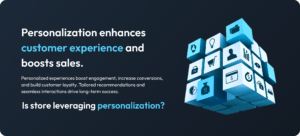
In today’s fast-paced world of e-commerce, personalization has become the secret ingredient for creating great customer experiences. Think about it—online shopping has taken over the retail world, and businesses are going the extra mile to tailor everything just for you. They’re making every interaction feel more meaningful and, well, personal.
Personalization isn’t just a fancy feature anymore; it’s the key to standing out and thriving in the crowded digital marketplace. Customers expect more than just a transaction—they want a shopping experience that feels like it was designed specifically for them. And that’s exactly what businesses are striving to deliver.
The Evolution of Personalization in E-Commerce
Have you ever thought about how far online shopping has come? In the early days, it was pretty basic—just a way to buy stuff without leaving your house. There wasn’t much in the way of personal touches or tailored experiences. It was purely transactional, like a virtual shopping list.
But look at where we are now! With the rise of data analytics and artificial intelligence (AI), e-commerce has transformed into something far more exciting. Businesses are now using all that information they gather about us—our preferences, habits, and even our wish lists—to create shopping experiences that feel custom-made.
Remember those simple product recommendations, like “people who bought this also bought that”? That was just the beginning. Today, personalization goes way beyond that. It’s in your email inbox with perfectly timed offers, in your search results showing you exactly what you’re looking for, and even on websites that seem to adapt as you browse. It’s a whole multi-channel strategy designed to make your shopping journey seamless and enjoyable.
Pretty cool, right? And it’s only getting better.
Why Personalization Matters
Have you noticed how some online stores seem to know exactly what you’re looking for? Here is the term personalization involved, and it’s changing the game in e-commerce. Here’s why it’s such a big deal:
Keeps You Engaged: When a store shows you items that match your style or interests, it grabs your attention, right? Personalized content makes shopping feel more exciting and relevant.
Boosts Purchases: Let’s be honest—when you feel like a brand “gets” you, you’re way more likely to hit that “Buy Now” button. Personalization not only helps you find what you want but also increases how much you spend.
Builds Loyalty: Shopping feels better when it’s tailored to you, creating a connection that makes you want to come back again and again.
Sets Brands Apart: In a world full of options, personalization helps brands stand out. It makes them more memorable and keeps them ahead of the competition.
How E-Commerce Gets Personal
Ever wonder how online stores make it happen? Here are some simple yet powerful strategies:
Track Your Preferences: By keeping an eye on what you browse, click, or buy, stores can figure out what you might like next and adjust their recommendations.
Smart Suggestions: Remember those “You might also like” sections? They’re powered by algorithms that pick products based on your past choices, making it easier to discover something perfect.
Emails and Offers: Ever get a discount code just for your favorite items? That’s a customized marketing campaign designed to make you feel special.
Local Touches: Stores use your location to show you products, deals, or even language settings that match where you are. It’s all about convenience.
Fun, Interactive Tools: Think quizzes to find your ideal product or virtual try-ons for clothes and glasses. These tools make shopping more personal and fun!
How artificial intelligence is making personalization in e-commerce smarter:
AI works by analyzing huge amounts of data about you, what you search for, what you click on, what you buy, and even how long you linger on a page. It uses this information to figure out your preferences and predict what you might want next. The result? Shopping experiences that feel tailor-made.
Think about product recommendations. AI-powered systems can suggest items based on your past purchases or browsing habits. It’s like having a personal shopper who knows your taste better than you do.
And it’s not just about products. AI helps create personalized email campaigns, offers that seem timed perfectly, and even website layouts that adapt to your behavior. It can even tweak what you see in real-time, like showing you a discount on something you just looked at or highlighting a product similar to one you’ve purchased before.
What’s really cool is how AI goes beyond just tracking patterns. It learns over time. If your preferences change, AI adapts, ensuring that your experience stays fresh and relevant. It’s like having a system that evolves with you.
It’s helping businesses connect with customers on a deeper level, making every interaction feel meaningful and unique.
Successful Examples of Personalization in E-Commerce
Amazon has set the benchmark for personalization in online shopping. Its ability to recommend products based on what customers have previously bought or browsed is remarkable.
The personalized homepage feels like it’s made just for you, making shopping and enjoyable.
Netflix, while not your typical e-commerce platform, has mastered the art of personalization with its recommendation engine. By analyzing viewing habits, it delivers suggestions that are so accurate, it’s hard not to binge-watch. This approach has inspired many retail businesses to adopt similar strategies.
Spotify takes personalization to another level by curating playlists and recommendations based on listening preferences.
It understands its users so well that discovering new music feels like a natural extension of their taste. This kind of connection keeps people coming back for more.
These examples show how businesses can use data and insights to create experiences that feel uniquely customised to each individual.
The Future of Personalization in E-Commerce
As technology advances, personalization will become even more sophisticated. Emerging trends include:
- Voice Commerce: Personalization tailored to voice-activated shopping experiences via virtual assistants like Alexa or Google Assistant.
- Augmented Reality (AR) Personalization: AR allows customers to visualize products in their environment, enhancing confidence and reducing returns.
- Real-Time Personalization: AI-driven systems will offer instant adaptations to changing customer behaviors during a single shopping session.
Where Data Meets Delight
Personalization in e-commerce is reshaping the way businesses engage with customers, elevating shopping from a mere transaction to an immersive, customized experience.
E-Commerce brands are not just meeting customer expectations,they are exceeding them.
As the digital world continues to evolve, personalization will remain the cornerstone of exceptional customer experiences, fostering growth, loyalty, and lasting satisfaction.
The future of e-commerce belongs to brands that dare to innovate and create truly unique, customer-centric journeys, setting themselves apart as leaders in this dynamic industry.
